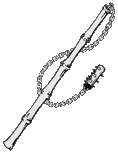Chigiriki
The chigiriki (契木術) is a Japanese flail weapon. It consists of a solid or hollow wood (sometimes bamboo) or iron staff with an iron weight and chain on the end, sometimes retractable. The chigiriki is a more aggressive variation of the parrying weapon kusarigama. It can be used to strike or entangle the opponent as well as to parry his blows and to capture or incapacitate an opponents weapon.[1][2]

The stick can be as long as the wielder's forearm or longer, while the length of the chain could also be of various lengths. The iron weight could have spikes and its shape could be round or be multi sided. Its origin is not clearly known. Chigiriki belong to the furi-zue family of weapons (brandishing-sticks)[3] which was any type of stick or staff with a chain attached and it is also one of the shinobi zue weapons (concealed staffs and canes), shinobi zue were often hollow and had multiple uses such as hiding other weapons such as shuriken or as a blow gun or a breathing tube.[2] Chigiriki-jutsu is the method of training using a ball and chain attached to a stick.[4] The chigiriki is said to be used by the Kiraku-ryū and the Araki-ryū schools.[5]
Gallery
- Two Japanese chigiriki, chain and weight weapons, one with a hollow iron staff and one with a hollow wood and iron staff.
- Japanese tetsu chigiriki, a hollow iron cane that has an iron weight attached to a chain hidden inside.
- Japanese tetsu chigiriki, a hollow iron cane that has an iron weight attached to a chain hidden inside.
References
- The new weapons of the world encyclopedia: an international ... - Page 17 Diagram Group - 2007
- Exotic weapons of the Ninja - Page 54 Sid Campbell - 1999
- Japan in days of yore: Volume 4 - Page 249 Walter Dening - 1905
- Comprehensive Asian fighting arts - Page 83 Donn F. Draeger, Robert W. Smith - 1980
- Tuttle dictionary of the martial arts of Korea, China & Japan - Page 48 Daniel Kogan, Sun-Jin Kim - 1996
- Amdur, Ellis. Old school: Essays on Japanese martial traditions. Edgework Archived 2010-08-01 at the Wayback Machine, 2002.